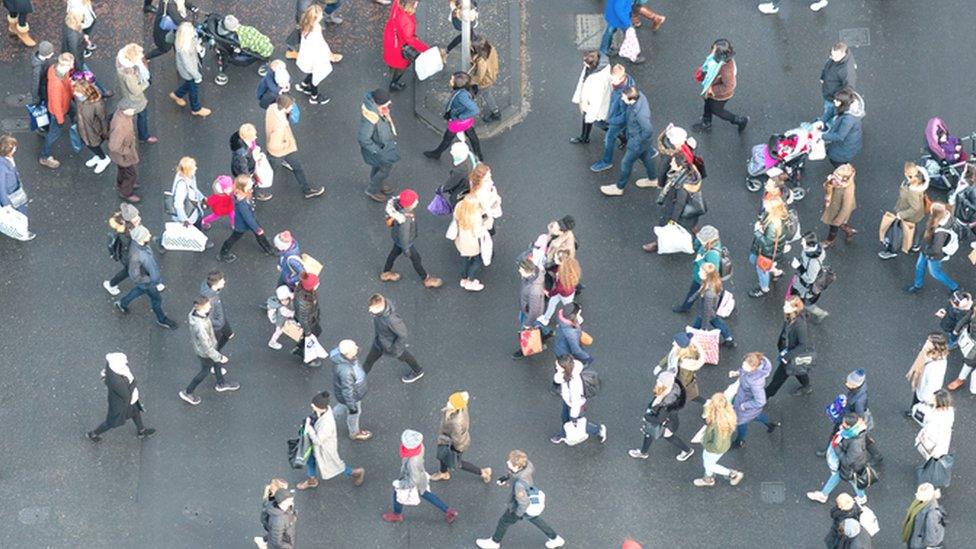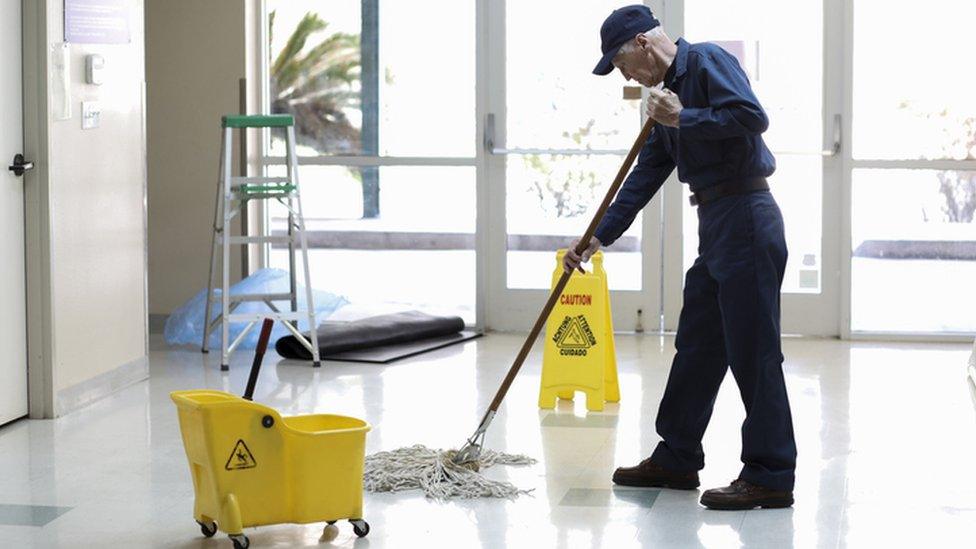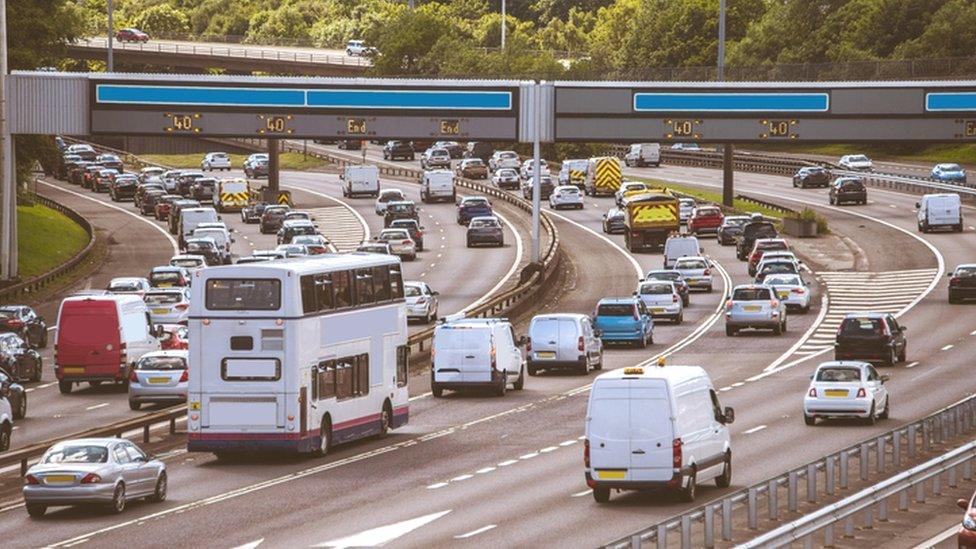A stitch in time saves billions
- Published

Glasgow's climate summit will bring big challenges to the ways that economies operate, in this and other countries. A new report has given an assessment of what it costs governments to fix things that keep on being broken.
Low pay, inadequate housing provision and pollution from fossil fuels all bring costs for the taxpayer, to bail out and to provide healthcare for those who suffer the consequences at the harsh end of the economy. It's called "failure demand", and Scotland has been slow to rise to the challenge - having had it spelled out clearly a decade ago.
Go into politics to change the world, and if you're lucky, you might get an opportunity to mop up the mess.
Government doesn't turn out as idealistic as many of us might like it to be. For many people, its best hope is to help those who fall through the cracks in the edifice of economy and society.
Homeless? It should get you sorted with somewhere over your head.
Underpaid? It'll supplement your income, up to a point.
Living with the effects of pollution? It can regulate to limit the damage, and build higher flood defences to guard against extreme weather.
So with the climate change summit coming into focus in Glasgow, and an army of environmental activists soon to descend on the city, there's more idealism in the autumnal air.
Some of that idealism is evident in a new report by the Wellbeing Alliance, a group that aims to take the Gross out of Domestic Product and to replace it with a wider definition of what an economy might be all about - primarily people and the planet.
Paying for breakages
Anna Chrysopoulou, Mark Anielski and, in Glasgow, Michael Weatherhead have penned a report that illustrates the problem in Scotland and the Canadian province of Alberta.
It may be that these happened to be handy examples, but they are also notable for sharing a big oil and gas industry presence, and some of the unpredictability that goes with it.
They also have devolved government, with both levels taking some of the responsibility for causing or for offsetting what they call "failure demand".
That's defined as "spending by governments in response to negative externalities generated by the current economic system". An externality is the bit that impacts on others without being accounted for as economic activity, such as air pollution.
Perhaps it's easier to understand, as the authors also put it, as "a cycle of paying to fix what we continue to break".
Precarious work
This was one of the issues addressed in Scotland by the Christie Commission, just over 10 years ago.
Former trade unionist Campbell Christie and his fellow commissioners, appointed by the Scottish government, looked at and listened carefully to the ways governments operate in Scotland, and concluded that there was an obvious need to invest in services in such a way that they avoided failure and higher government payments further down the track.
As many have commented on the 10th anniversary, and as the deputy first minister has conceded, that need has not been adequately met. "Failure demand" goes on, and on.

Tuesday's report takes several examples, starting with work.
A week after a large swathe was cut through Universal Credit, this is another reminder that the welfare system props up a system that has a lot of people in precarious jobs and paid well under a living wage.
Towards the end of last decade, 61% of working age adults who were living in relative poverty were living in a household with at least one person in paid work.
For 18 years, they reckon there have been half-a-million Scots each year working in precarious jobs, such as the ones we've come to know as the "gig economy" and zero hours contracts.

Those getting a toe-hold on the bottom of a career ladder have increasingly found that it doesn't go far up the way. You can take on more responsibility, but the pay rewards for that can be limited.
Since 1999, UK minimum wage legislation has helped a lot. And as a new economics Nobel prize winner has shown, it didn't have to lead to job losses as some had feared. But it has left a lot of people with pay just above it, and it still doesn't reach the minimum reckoned to be necessary to support family life.
So what can governments do? They can compensate for an economic system in which the going rate for pay is not the rate that sustains people's livelihoods to an adequate standard. You could see it as subsidising employers.
You could also see it - though this report does not - as re-circulating payroll taxes and targeting them at those most in need of support.
So across the different welfare and benefits payments in the past seven years or so, the state provided between £600m and £840m in tax credits, free school meals and health services for work-related health problems.
These, says this report, "are the high and growing costs of failure demand".
Temporary homes
It goes on to point out the problems of housing in Scotland. Because housing is also seen as an asset, meaning house prices have decoupled from pay, and because the private rented sector does not operate efficiently, it helps explain why the total number of households in temporary accommodation has increased since 2002, and remained over 10,000 for the last decade.
The total cost of temporary accommodation provision in Scotland is estimated to be over £111m each year. A recent Audit Scotland report found it would have saved £27m per year if people in temporary accommodation had the permanent variety.
The total excess cost (or failure demand) of health care for people who have ever experienced homelessness is over reckoned to be £900m, based on calculations for 2015. At least one in 12 Scots is reckoned to have been homeless at some point in their lives.
More than a third of that health cost is in mental health prescriptions, but there are also associations with heart, lung and cancer problems. It is hard to isolate precise causes, as such issues are complex. Fortunately, two other winners of this year's Nobel economics prize have been working on that question of isolating causal relationships.
Congested roads
What of the environment - the big issue for the climate summit in Glasgow? One of the relative advantages of living in Scotland is a lot of fresh air blowing in off the Atlantic.
But it's not so fresh that the impact of economic activity doesn't carry big costs of air and water pollution. And this is where the calculations become more global, because that's where the impact is felt.
The International Monetary Fund is cited, with its calculation that governments spend £3.8 trillion each year on subsidising the effects of fossil fuel burning. Scotland's share of that is £1.9bn.

That can be in tax breaks to keep drilling, but it also includes the effects on health of poor air quality, leading to expensive treatments for ill health, and premature deaths. There's the cost of traffic congestion, of road repairs and clearing up after road accidents, and the bills to prepare for extreme weather are rising.
Looked at that way, the annual cost comes to somewhere between £771m and £956m per year.
Quality of life
Tuesday morning brings a monthly deluge of statistics showing the state of the labour market. Even after the end of furlough (and before the figures take account of it winding up), it will be hailed as resilient. I might even call it that myself.
But behind the success of getting people into work, and the concern that there's more work than there are people to do it, there's a more complex picture of a labour market and economy which isn't serving employers that well, and certainly isn't serving those who don't make enough out of it for a decent quality of life.
